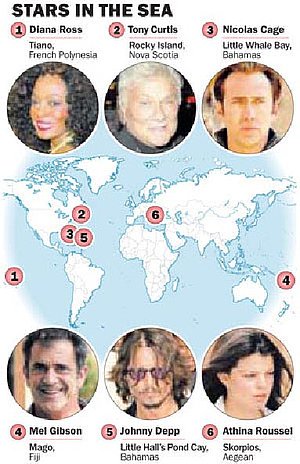An island sir? Meet the man who sells them to the world

By Roger Boyes, The Times (19 August 2006)
IT WAS the perfect day to buy an island. Terror level at “red”; bomb scares in several European airports; terminals clogged with forgotten passengers; rain steaming up the windows of stalled planes.
“Caribbean?” asks Farhan Vladi, the world’s leading island-broker, “or Pacific?”
The demand for private islands has never been higher. During the Cold War the rich would build nuclear shelters on their estates. Now they are looking for a piece of land surrounded by sea where they can support themselves when Armageddon arrives.
“It’s the fear of terrorism,” says Mr Vladi, who sold his first island in 1970 at the age of 25, “coupled with the fear that quality of life is disappearing. The two anxieties are linked.”
Since September 11, 2001, Hollywood stars have been piling into the island market.
Johnny Depp bought the 45-acre (18 hectare) Little Hall’s Pond Cay in the Bahamas, with its six private beaches. Leonardo DiCaprio snapped up a 104-acre island with an airstrip in Belize.
Nicolas Cage and Mel Gibson have also secured their bolt holes. There is romance involved too, of course, and the burning desire to escape briefly from the paparazzi.
Businessmen out of the media spotlight have also been gripped by the buying frenzy. Leonardo Ferragamo, of the Italian shoe dynasty, is also owner of an island, as is Bernard Arnault, who owns 50 per cent of Louis Vuitton Moët Hennessy.
In the days of the ship owner Aristotle Onassis islands were little more than fashion accessories for the super-rich. Now, Mr Vladi says, they have become an important cog in a new survivalist mentality. There is a run on islands in Canada and New Zealand, countries that are thought unlikely to be drawn into some apocalyptic war between Islam and the West.
The sales numbers are unclear — deliberately so, since most owners insist on discretion — but several dozen have exchanged hands since 9/11. The New Zealand inventory lists 21 islands and island properties — 11 have been sold recently or are under offer.
“What is the worst thing that can happen?” says Mr Vladi, who has sold 1,800 islands in his career. “A terror attack on a nuclear power station is my bet. So you want an island where the winds are in your favour. In New Zealand the winds come from the South Pole, which is perfect.”
Mr Vladi has bought his own island there and a proud photograph of his 50 cashmere goats is propped up close to his daughter’s graduation picture. “I find I can work six weeks there over Christmas because new technology keeps me in touch.”
And that is the point: islands used to be the preserve of those who favoured exclusive getaway holidays. Now, as survivalist options, they have to be both remote (well away from radioactive clouds) and in touch.
Solar panels, satellite dishes, cheap desalination and the internet have transformed island living. It is now possible to function as an active stockbroker from a beach hut. If you go bust, where better to hide than the same hut? And if planes start to fall from the sky, if the world succumbs to panic, you can go fishing.
Islands in Nova Scotia have become affordable. The three Chapleau Islands — 12.3 acres, 7.4 acres and 35 acres — are on offer at €225,000 (£158,000), the price of a two-bedroom flat in Walthamstow. Other rocks in Canada can still be had for €30,000. The hidden cost of an island is in the maintenance — the plumbers that have to be flown in when the sewage system explodes — and the construction work.
“Someone who buys a $20 million island would probably build a $10 million home on it,” says Ron Kurtz, president of the American Affluence Research Centre.
On top of that, he estimates, up to 10 per cent of the investment’s value goes on staff and maintenance. All island brokers recommend renting an island for a fortnight before buying it. “You test-drive a car, so why not take the island for a spin?” says Cheyenne Morrison, head of Coldwell Banker Morrisons Private Islands, based in Australia.
Impulse buying, no matter how high the terrorist threat, is a bad idea.
On a whim, Gibson bought Mago Island, eight lush square miles in the Fijian islands, only to find that the place was inhabited by truculent coconut farmers who expected the new owner to bale them out.
Cage, by contrast, has been a cautious purchaser, taking a helicopter across atolls with Mr Vladi to find an island that has the right shape and colour.
The role of an island broker is to introduce some geographical knowhow to the Hollywood panic-buyers.
“They say they want an island in the sun, no rain, with plenty of green vegetation,” sighs Mr Vladi.
“So I have to tell them that vegetation doesn’t grow without rain.”
The stars are also instructed to buy their islands within 90 helicopter or boat minutes of a doctor — “just in case a coconut falls on your head”.
The most intriguing properties up for sale are not the Polynesian hideaways but verdant islands just off the French coast. The Île du Nord, between the Atlantic and Bordeaux, is going for €6.5 million. For that you get 1,100 acres, including vineyards that produce 228,000 bottles of Bordeaux Supérieur a year — with your own label. The location may not protect you from Osama bin Laden. But, if the worst comes to the worst, you will be able to drink yourself into oblivion.
